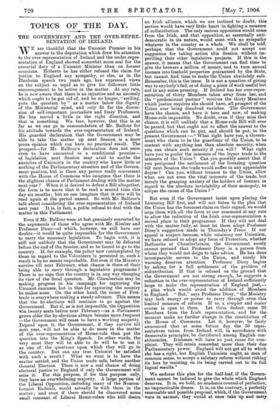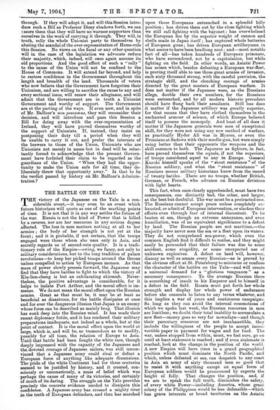AN TE are thankful that the Unionist Premier in his answer
to the deputation which drew his attention to the over-representation of Ireland and the under-repre- sentation of England showed somewhat more zeal for the essential duty of a Unionist Minister than on former occasions. Hitherto he has either refused the claim for justice to England any sympathy, or else, as in the Blenheim speech two years ago, has expressed views on the subject so tepid as to give his followers .little encouragement to be active in the matter. At any rate, he is now aware that there is an injustice and an anomaly which ought to be got rid of, and he no longer, " smiling, puts the question by " as a matter below the dignity of the Ministerial mind, and only fit for the discus- sion of self-important journalists and fussy Professors. He has moved a little in the right direction, and that is something. We fear, however, that this is as far as we can go in commendation of Mr. Balfour for his attitude towards the over-representation of Ireland. His guarded declaration that the Government may be able to take the matter up next Session is a mere pious opinion which can have no practical result. The prospect—for Mr. Balfour's declaration does not seem even, to have amounted to a conditional promise—. of legislation next Session may avail to soothe the anxieties of Unionists in the country who know little or nothing of the Parliamentary situation and of the Govern- ment position, but is there any person really conversant with the House of Commons who imagines that there is the slightest chance of Parliament dealing with the matter next year ? When it is desired to defeat a Bill altogether, the form is to move that it be read a second time this day six months ; but no one imagines that it ever will be read again at the period named. So with Mr. Balfour's talk about considering the over-representation of Ireland next year. It is, in fact, a. polite refusal to deal with the matter in this Parliament.
Even if Mr. Balfour were at last genuinely converted by the arguments of those who agree with Mr. Kimber and Professor Dicey—of which, however, we still have our doubts—it would be quite impossible for the Government to carry the necessary legislation. To begin with, it is still not unlikely that the Government may be defeated before the end of the Session, and so be forced to go to the country. If, for example, the policy now contemplated by- them in regard to the Volunteers is persisted in, such a- result is by no means improbable. But even if the Ministry survive till next February, what chance is there of their being able to carry through a legislative programme There is no sign that the country is in any way changing its view of the fiscal question. Mr. Chamberlain may be making progress in his campaign for capturing the Unionist caucuses, but in that for capturing the country he makes none. On the other hand, the cause of Free- trade is everywhere making a steady advance. This means that the bv-elections will continue to go against the Government. But if, as is not impossible, the Opposition win twenty seats before next February—as a Parliament grows older the by-elections always become more frequent —the Government will cease to have a working majority.. Depend upon it, the Government, if they survive till next year, will not be able to do more in the matter of the over-representation of Home-rule than put the question into the King's Speech. In other words, the very most they will be able to do will be to use it as one of the questions upon which they will go to the country. But can any true Unionist be satisfied with such a result ? What we want is to lithe the matter settled, and the Union made safe, before another General Election. There is now a real chance of doing electoral justice to England if only the Government will seize it. For this purpose, if for this purpose only, they have an overwhelming majority. A large portion of the Liberal Opposition, including many of the Noncon- formist Radicals, would actually be with them in the matter ; and even if there should be discovered some small remnant of Liberal Home-rulers who still 'desire ' of redistribution. The only serious opposition would come from the Irish, and that opposition, so essentially anti- democratic in its nature, would meet with no sympathy whatever in the country as a whole. We shall be told, perhaps, that the Government could not accept our suggestion for taking action this Session without im- perilling their other legislative projects. If this is the answer, it means that the Government can find time to give the brewers a million of money, and-to turn: annual licenses into freehold properties guaranteed by the State, but cannot find_ time to make the Union absolutely safe. Remember, this is the issue. It is not. a question of giving way to anybody's fad, or of doing a piece of work useful but not in any sense pressing. - If Ireland. has her over-repre- sentation of thirty Members taken away from her, and the "predominant partner" receives the thirty Members which justice requires she should have, all prospect of the Union ever being dissolved vanishes. The Government have the chance, and have it here and now, of making Home-rule impossible. No doubt, even if they miss that chance, it is still unlikely that a Home-rule Bill will ever be passed, but that ought not to affect the answer to the questions which can be put, and should be put, to the present Government :—" What right have you, a Govern- ment who claim to be the guardians of the Union, to be content with anything less than absolute security, when you can obtain such security if you will ? What right have you to prefer the interests of the liquor trade to the interests of the Union ? Can you possibly assert that if you postponed the settlement of the licensing question till next Session the trade would suffer in any appreciable degree ? Can you, without treason to the Union, allow what are not even the vital interests of the trade, but merely the grasping anxiety of the holders of licenses in regard to the absolute inviolability of their monopoly, to eclipse the cause of the Union ? "
But even if the Governthent insist upon placing the Licensing Bill first, and will not listen to the plea that the Union has the foremost claim on their regard, we would urge them with all the force at our command at any rate to allow the reduction of the Irish over-representation a second place in their programme. If they will not deal with the matter fully, at least let them adopt Professor Dicey's suggestion made in Thursday's Times. If our appeal is suspect because, while retaining our Unionism, we have refused to adopt any form of Protection, whether Balfourite or Chamberlainite, the Government surely cannot pretend that Professor Dicey is a person from whom they would not deign to take advice. He has done incomparable service to the Union, and' surely his warning deserves attention. Professor Dicey begins by asking for a full settlement of the problem of redistribution. If, that is refused on the ground that the Government are not strong enough, he suggests a reduction in the over-representation of Ireland sufficiently large to make the representation of England just,— a . plan which would avoid the addition of Members to England. " _put," says Professor Dicey, " the Ministry may lack energy or power to carry ,through even this limited measure of reform. If so, a simpler and easier course is open to them. Let them* deduct some 30 Members from the Irish representation, and for, the moment make no further Change in the constitution of the House of Commons. Let it, however, 'be fairly announced that at some future day the 30 repre- sentatives taken from Ireland will, in accordance with democratic principles, be distributed among English con- stituencies. Irishmen will have no just cause for com- plaint. They will retain somewhat more than:their due Parliamentary power. England will not get all to which she has a right, but English Unionists ought, as men of common sense, to accept a salutary reform without risking its loss by insisting on its being carried out to its full logical results."
We endorse this plea for the half-loaf, if the Govern- ment cannot be induced to give the whole which England deserves. It is, we hold, no academic counsel of petfection, no impracticable dream. It is, on the contrary, a perfectly reasonable and possible proposal, which, if the Government were in earnest, they would at once take up and carry through. If they will adopt it, and will this Session intro- duce such a Bill as Professor Dicey shadows forth, we can nssure them that they will have no warmer supporters than ourselves in the work of carrying it through. They will, in truth, rally the whole Unionist party to themselves by abating the scandal of the over-representation of Home-rule this Session. No views on the fiscal or any other question will in the case of the legislation we advocate reduce their majority, which, indeed, will once again assume its old proportions. And the good effect of such a "rally " to -the cause of the Union -will not be confined to the House of Commons. It will extend far beyond, and help to restore confidence in. the Government throughout the length and breadth of the land. Thousands of voters who now believe that the Government have forgotten their Unionism, and are willing to sacrifice the cause to any and every sectional issue, will renew their allegiance, and will admit that the Government are in truth a Unionist Government and worthy of support. The Government are at the parting of the ways. If even now, and in spite of Mr. Balfour's non possumus, they will reconsider their decision, and will introduce and pass this Session a Bill for doing away with the over-representation of Ireland, they will have proved themselves worthy of the support of Unionists. If, instead, they insist on postponing their duty till a period when . they will be• unable to carry it out, and prefer the interests of the brewers to those of the Union, Unionists who are Unionists not merely in name but in deed will be reluc- tantly forced to acknowledge that the present Govern- ment have forfeited their claim to be regarded as the guardians of the Union. " When they had the oppor- tunity to make the Union safe for all time, they de- liberately threw that opportunity away." Is that to be the verdict passed by history on Mr. Balfour's Adminis- tration ?











































 Previous page
Previous page